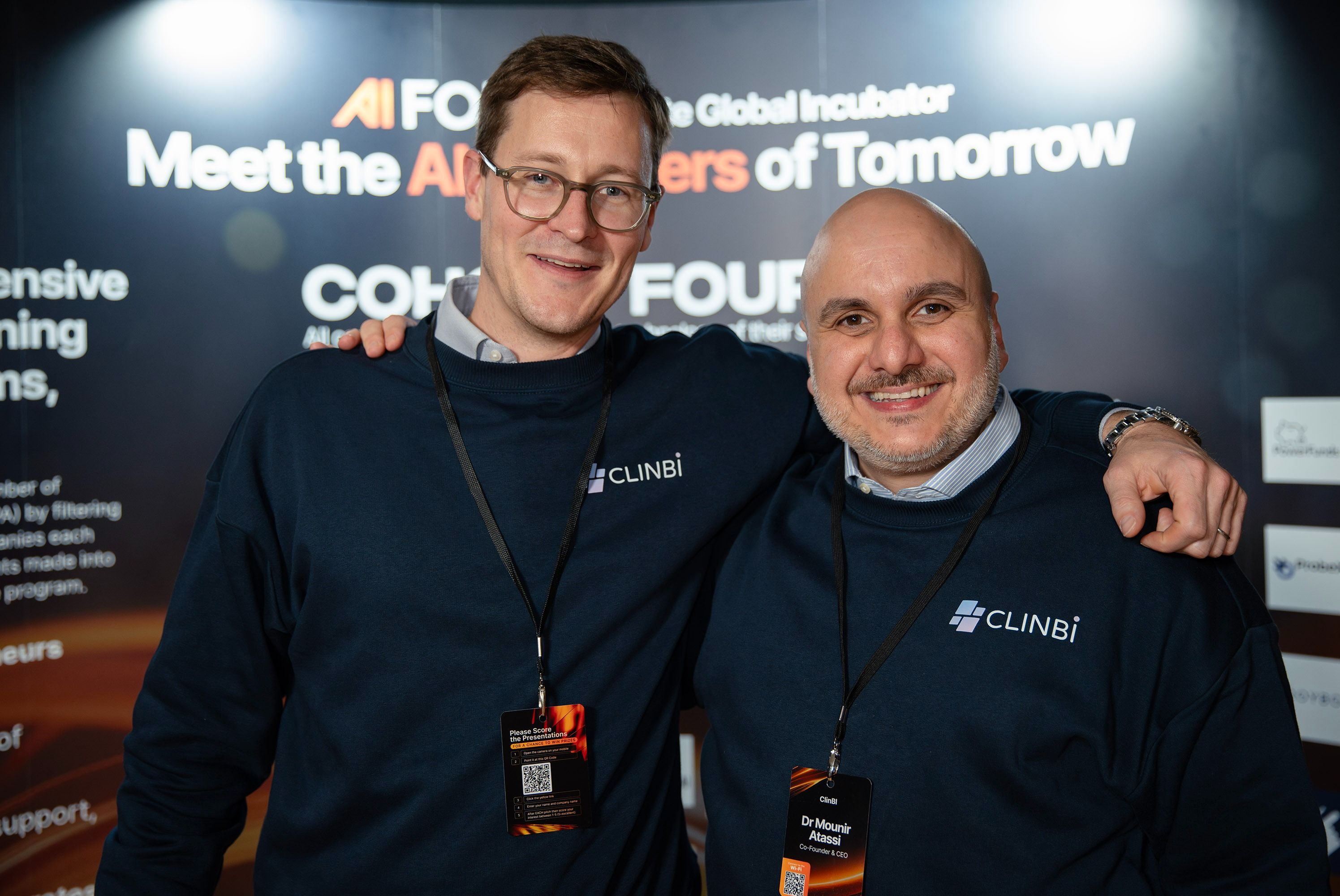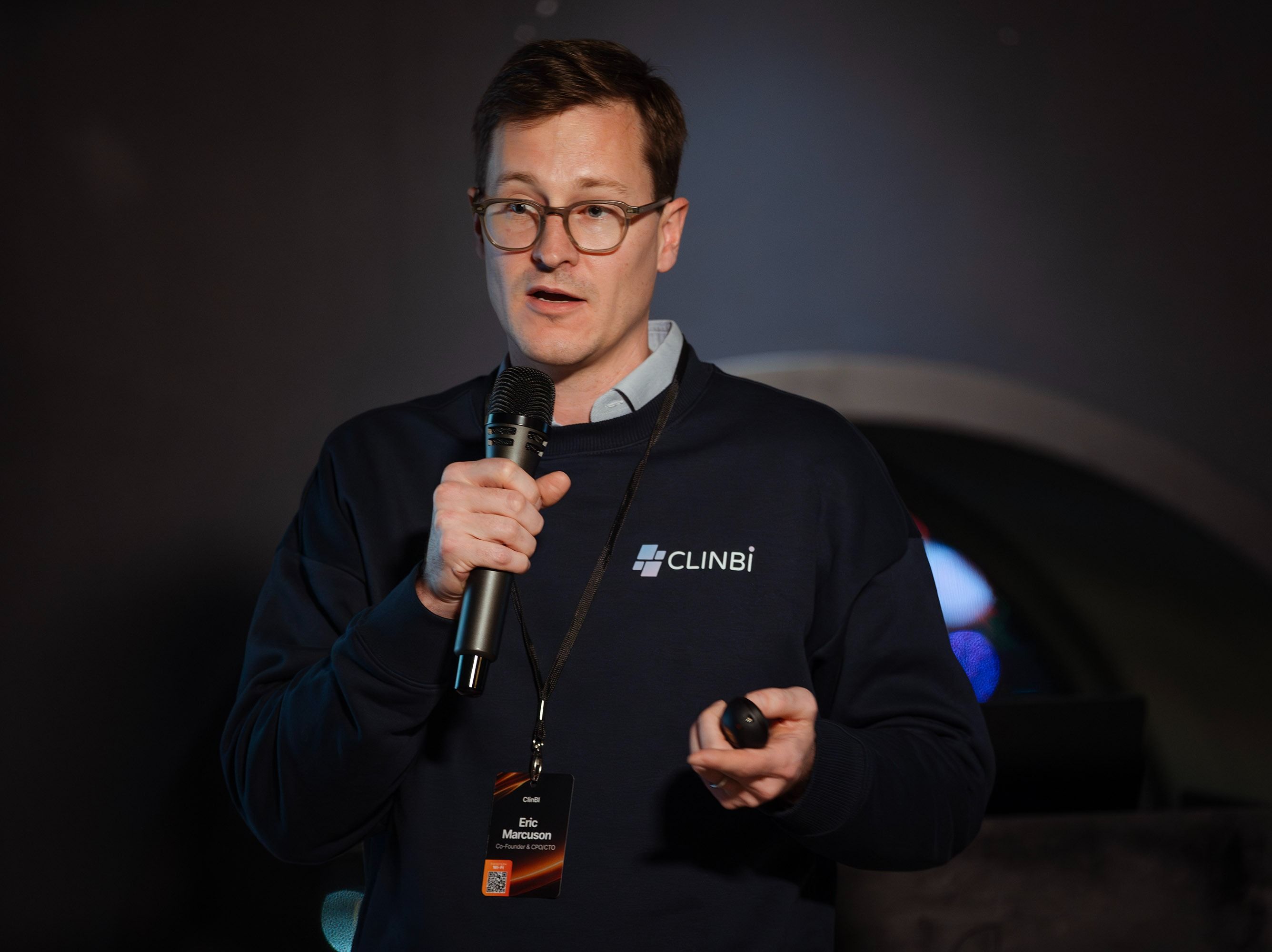“Clarity Is the Human Need We’re Here to Solve” Eric Marcuson on Empowering Time-Strapped Entrepreneurs
20 Aug 2025
At ClinBI, founders Eric Marcuson and Mounir Atassi have identified a simple yet profound truth.
Behind every growing medical practice is a team grappling with too much uncertainty and limited insight to act with confidence.
Their solution is an AI-powered operational partner that helps navigate complexity and supports smarter, informed decision-making.
But beyond the technology, ClinBI is a people-first startup seeking builders ready to join a journey of growth and impact. We sat down with Eric to discuss what it takes to scale from scratch – and why honesty and authenticity is key to attracting and retaining new hires with a true startup mindset.
What specific problem is ClinBI solving, and why does it matter now?
We started with a simple observation: our customers are small business owners first, and medical clinic practitioners second. And they want to make informed business decisions.
Many have grown their practices from a single site to a regional presence. They’re ambitious, capable entrepreneurs – but like all founders, they carry a quiet burden of uncertainty.
There’s never enough time in the day. And in the back of their minds are questions like: Am I making the right decision? How can I de-risk this? How can I move faster, with more confidence?
That’s what we’re here for.
We’re building an operational business partner that understands the clinic as deeply as its founder does. Maybe more. Something that feels like a coach, a confidant, and a guide.
At its core, we’re addressing a very human need: clarity. And we’re doing it in a way that’s fast, intelligent, and grounded in financial and operational analysis, so our customers can make better decisions and make them faster.
How did the idea come about? Give us the origin story.
My co-founder, Mounir, is a dentist. Like me, he left his first profession and stepped into the big wide world of business.
Independently, we both discovered the same thing: many firms aren’t being run as well as they could be. But it doesn’t take much to turn them around. There’s a lot of low-hanging fruit – simple changes that can make a big difference.
Most SME and mid-market clinic owners don’t have business degrees or deep strategy experience. They’ve built their practices from the ground up, often without exposure to the kinds of tools and frameworks that could really help them scale.
Not every technique from the corporate playbook applies, but some do. And if we can translate those ideas into something digestible and actionable, we can tap into real impact at scale.
So our origin story is really a convergence. Two different industries, one shared insight: small businesses everywhere could thrive if they had the right business support, delivered in a way they could actually use.
There’s a lot of uncertainty, even fear, in the wider population when it comes to AI. What are some of the most common misconceptions you hear?
I was having dinner with a good friend recently and he said to me, “What did AI ever do for us?”
That question really stuck with me. Do you respond with stats? With use cases? But what stood out wasn’t the specifics, it was that AI hadn’t yet connected with him personally.
I think that’s true for a lot of people. There’s still an us-versus-them mindset around AI. For me, it's part of my daily life. My relationship with Google has changed. I now use AI tools to work, learn, think differently, and reduce friction – and I like the idea that it’s working for me.
So the question people are really asking is: What will AI do for me?
And that question brings up a lot – your past experiences with technology, whether you find change empowering or threatening, whether your relationship with tech has felt adversarial or enabling. One of the biggest barriers is that AI still feels like a black box.
But we saw the same thing with electricity and automobiles. People didn’t understand how they worked at first, either. Sure, AI will disrupt the way people work for better and worse… but that’s the nature of progress. When cars came along, we needed fewer blacksmiths making horseshoes – but more mechanics.
Everyone’s relationship with AI will look different. For some, it’ll help them survive today; for others, it’ll unlock their future ambitions. It fits all over Maslow’s hierarchy. But there’s no one-size-fits-all answer.
So while this isn’t a specific problem ClinBI is solving, I do think it’s something we, as founders building with AI, have the responsibility and opportunity to shape. How we present it, how we build with it, how we bring people into the conversation – all of that influences whether it feels empowering or alienating.
“AI safety” can mean very different things depending on who you're speaking to. For you, what does AI safety actually look like in practice?
There are really two schools of thought here. For us, it starts with deferring to the customer.
We operate in a quasi-medical space, so there are strict legal boundaries around what we can and can’t do. Those are non-negotiable.
But beyond that, there's the creative side of AI – and that’s where it gets personal. Personally, I'm pretty data-open. I'm not too concerned about who has access to my data. But not everyone feels the same and we have to respect that, whether it's a temporary discomfort or a permanent preference.
So when we build, the first question we ask is: are we acting on the customer's behalf?
Ultimately, we want to be a force for good. If you're not, your shelf life tends to be short. We follow best practices in data security, adhere to all relevant legal frameworks, and build with care. Fortunately, a lot of modern tools – including low-code platforms and digital service providers – are secure by design, because they have to be.
We don’t see safety as a barrier. Guardrails create space for thoughtful innovation. And if you start from a place of positive intent, you’ll naturally align with ethical, legal, and regulatory standards.
What has been the biggest challenge in bringing ClinBI to market at scale?
For most founders, one of the biggest challenges is figuring out what customers actually want.
There are so many projects building toward open-ended outcomes. But the real task is delivering clear, high-quality value in a way customers can appreciate before day one. If you can do that, a lot of other things start to fall into place.
But product–market fit isn’t something you check off and move on from. It’s ongoing. Product–channel fit evolves. Customer value shifts. All of it changes over time, and you have to be aware of this.
We wrestle with that just like everyone else.
The other big challenge is people. You're working with humans… and humans are complex. Whether it’s your team or your customers, understanding how people think, communicate, and collaborate is critical. Interpersonal dynamics matter. As does maintaining a high speed of iteration, learning, and improving. That means always talking to the customer, and those around them.
So those are the two big ones for us: staying close to evolving customer value, and building alignment to a shared vision. We're figuring it out like everyone else.
What are you looking for in future hires?
Our team is super small. Probably smaller than you’d expect! And while some see that as a disadvantage, we see it as an opportunity.
Once you hit 16–20 people, you start to face real managerial and structural challenges. We’re well below that threshold, and intentionally so.
For the right person, that’s attractive. If you’re looking for stability (a corporate role with a ticket-based management system, mortgage covered, and minimal risk) we’re probably not for you. And that’s okay. But if you want to work with experienced founders who’ve built things before, who understand the customer, and who are aiming to build something that scales – that’s our niche.
We’re not just selling to customers; we’re also “selling” to potential teammates. If someone’s going to give us years of their life, we owe them more than just a salary. They want to be heard. They want equity, upside, creativity, fun. They want to build.
That’s who we’re looking for. Builders who want to come on a journey with a high probability of success, a solid foundation, and leaders who listen.
We’re not a top-down org. We're looking for experienced people with diverse skillsets – that diversity fuels creativity, encourages alternative approaches to problem-solving, and drives high innovation potential. It's a key part of our company value. And while that means we’re not for everyone, we’re very clear about what we are, and that authenticity helps us find the right people.
You’re obviously incredibly busy. How do you decompress outside of work?
First and foremost, you have to nourish yourself by eating well. That means smart, intentional choices that support your body and mind.
You also need people around you whose opinions you respect. I’m incredibly lucky to be married to someone like that. She’s brilliant, analytical, and strategic – and also a very different personality to mine, but we understand each other’s languages completely.
Kids are great for perspective. They force you to decompress, whether you want to or not!
There was a time when I did a lot of extreme sports — and part of the draw was that it made it impossible to think about work. That total focus was a kind of freedom.
Now, I run. I read. I average two books a week, and that’s hugely important to me. It’s how I reset and reframe.
Finally, if you weren't working on ClinBI, what other problems would you be trying to solve with AI?
It might sound a bit anti-Founder, but in my former life, I made furniture. You’re working with your hands, creating something tangible. You control the process. The conflict is between your vision, tools, and the materials at hand. I’d probably spend some time doing that again.
But if you’re talking big-picture – the kind of global problem I’d want to work on – I think it would be space exploration. There’s something profound about the idea of exploration.
Earth is, in some ways, our practice run. And if we can carry forward the right lessons (assuming we can capture them, and implement them) there’s an opportunity to build something entirely new. To have a truly new opportunity is rare, and outer space is the place that offers it!

